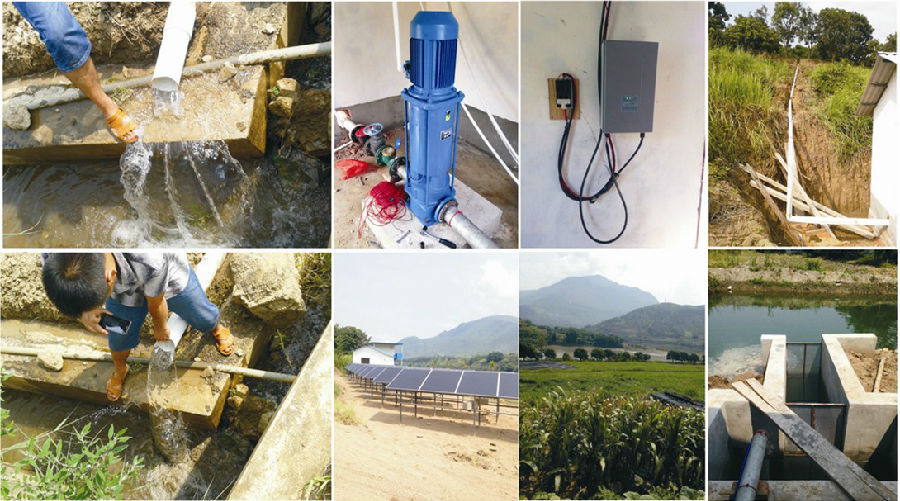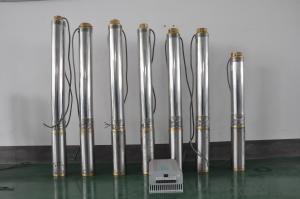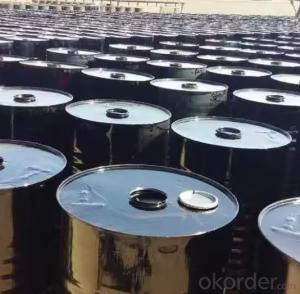Solar Water Pump L3D-5.5-320
- Loading Port:
- China Main Port
- Payment Terms:
- TT OR LC
- Min Order Qty:
- -
- Supply Capability:
- 300 sets unit/month
OKorder Service Pledge
OKorder Financial Service
You Might Also Like
Product description:
Product: Solar water pump
Model:L3D-5.5-320
 Appilication:
Appilication:
surface pump
for surface water of pond, river, lake
for irrigation of a big farm with3000 m2 on the top of a high mountain
Product specification:
flow rate:5.5m3/ hour, 44m3/day.
lift: 10m-320m
pump diameter: 296mm
Pump installed on the ground, outlet to the water surface:4m
with AC motor, motor power:5.5kW
but only need solar power:6kW(while Grundfos pump needs at least 25kW solar power, our pump can save more than 70% solar panel power,save USD12000 cost for solar panel per set.
Material:
Pump inside: stainless steel and wearable nylon,it enables our solar pump to have 10 years sevice life.
Motor : AC motor, 380V , three phase , 50Hz. The pump also can connect with grid power directly.
Certification:
3 International patent
ISO9001
CE
Warranty:2 years
- Q:Are there any government incentives or rebates for installing a solar pump?
- Yes, there are government incentives and rebates available for installing a solar pump. Many countries and regions offer various programs and schemes to promote the use of renewable energy, including solar-powered technologies like solar pumps. These incentives can range from tax credits, grants, subsidies, and rebates, which can significantly reduce the upfront costs of installing a solar pump and make it more financially viable for individuals and businesses. It is recommended to check with local government agencies or renewable energy organizations to learn about specific incentives available in your area.
- Q:Can a solar pump be used for water supply in vineyards?
- Yes, a solar pump can be used for water supply in vineyards. Solar pumps are an environmentally friendly and cost-effective solution for providing water to vineyards. They harness solar energy to power the pump, eliminating the need for electricity or fuel. This makes them an ideal option for remote or off-grid vineyards. Additionally, solar pumps can provide a reliable and consistent water supply, ensuring optimal vineyard irrigation and promoting healthy growth of the vines.
- Q:Can a solar pump be used for geothermal heating and cooling?
- No, a solar pump cannot be used for geothermal heating and cooling. Geothermal heating and cooling systems rely on the natural heat from the earth's core to provide heating and cooling for buildings. These systems typically use a series of underground pipes to circulate a heat transfer fluid, such as water or antifreeze, which absorbs heat from the ground in winter and releases heat into the ground in summer. On the other hand, solar pumps are designed to harness energy from the sun to power various applications, such as pumping water or circulating fluids. They are not specifically designed to tap into or utilize geothermal energy. While solar energy can be used to power other components of a geothermal system, such as pumps or fans, it cannot replace the geothermal heat exchange process that is fundamental to these systems.
- Q:Can a solar pump be used for livestock cooling systems?
- Indeed, livestock cooling systems can utilize a solar pump. These pumps are specifically designed to function by harnessing solar energy, rendering them a sustainable and economically viable option for various purposes, including the cooling of livestock. Their capacity to circulate water through cooling systems aids in temperature regulation and provides relief for livestock during excessively hot weather conditions. By harnessing the immense power of the sun, solar pumps present an environmentally conscious alternative to conventional pumps, leading to reduced electricity expenses and a minimized carbon footprint. Furthermore, solar pumps are often low-maintenance and can be effortlessly installed in remote areas, making them a pragmatic choice for livestock cooling systems in rural regions.
- Q:Can a solar pump be used for water supply in remote farms or ranches?
- Absolutely! A solar pump is an excellent choice for supplying water to remote farms or ranches. When there is no access to grid electricity, solar pumps are the perfect solution. They harness solar energy to operate the pump, eliminating the need for fuel or electricity from the grid. Remote farms or ranches greatly benefit from solar pumps. They offer a cost-effective and sustainable water supply solution. By avoiding the use of expensive and unreliable fuel-powered generators or the installation of long power lines, these pumps provide a practical solution. Moreover, solar pumps are easy to install and require minimal maintenance. They are designed to work efficiently even in harsh weather conditions and can extract water from deep wells or boreholes. Whether it's for irrigation, livestock watering, or even everyday domestic use, solar pumps can handle a variety of water supply applications. Using a solar pump for water supply in remote farms or ranches brings numerous advantages. It reduces reliance on fossil fuels, decreases operational costs, and supports environmental sustainability. Additionally, it ensures a consistent and uninterrupted water supply, promoting smooth agricultural activities in these isolated areas. In conclusion, a solar pump is an incredibly suitable and pragmatic choice for water supply in remote farms or ranches. It offers an affordable and sustainable solution, providing a dependable water source for various agricultural needs.
- Q:Can a solar pump be used for fountain installations?
- Yes, a solar pump can definitely be used for fountain installations. Solar pumps are designed to run on solar energy, making them a great eco-friendly option for powering fountains. They can effectively circulate water and create beautiful fountain displays without the need for electricity or traditional power sources. Additionally, solar pumps are easy to install, operate, and maintain, making them a popular choice for fountain installations in outdoor spaces.
- Q:How does a solar pump handle water treatment chemicals?
- A solar pump does not directly handle water treatment chemicals. Its main function is to pump water using solar energy. However, if water treatment chemicals are needed, they are typically added to the water storage or treatment system separately from the solar pump.
- Q:How much does a solar pump cost?
- The cost of a solar pump can vary depending on various factors, such as the brand, size, capacity, and additional features. On average, a basic solar pump can range from $500 to $2,500, while more advanced models with higher capacity and additional functionalities can cost up to $10,000 or more.
- Q:How does the efficiency of a solar pump compare to traditional electric pumps?
- The efficiency of a solar pump is generally higher than that of traditional electric pumps. Solar pumps utilize energy from the sun, which is a renewable source, making them more environmentally friendly. Additionally, solar pumps operate with direct current (DC) power, which eliminates the need for converting electricity from alternating current (AC) as traditional electric pumps do. This results in lower energy losses and higher efficiency for solar pumps.
- Q:Can solar pumps be used for water supply in public parks or gardens?
- Yes, solar pumps can definitely be used for water supply in public parks or gardens. Solar pumps rely on sunlight to generate power, making them a sustainable and eco-friendly option for watering plants, maintaining fountains, or supplying water to recreational areas. They eliminate the need for electricity or fuel, reducing operational costs and carbon emissions. Additionally, solar pumps can be easily installed and require minimal maintenance, making them an ideal choice for public spaces.
1. Manufacturer Overview |
|
|---|---|
| Location | |
| Year Established | |
| Annual Output Value | |
| Main Markets | |
| Company Certifications | |
2. Manufacturer Certificates |
|
|---|---|
| a) Certification Name | |
| Range | |
| Reference | |
| Validity Period | |
3. Manufacturer Capability |
|
|---|---|
| a)Trade Capacity | |
| Nearest Port | |
| Export Percentage | |
| No.of Employees in Trade Department | |
| Language Spoken: | |
| b)Factory Information | |
| Factory Size: | |
| No. of Production Lines | |
| Contract Manufacturing | |
| Product Price Range | |
Send your message to us
Solar Water Pump L3D-5.5-320
- Loading Port:
- China Main Port
- Payment Terms:
- TT OR LC
- Min Order Qty:
- -
- Supply Capability:
- 300 sets unit/month
OKorder Service Pledge
OKorder Financial Service
Similar products
New products
Hot products
Hot Searches
Related keywords


























